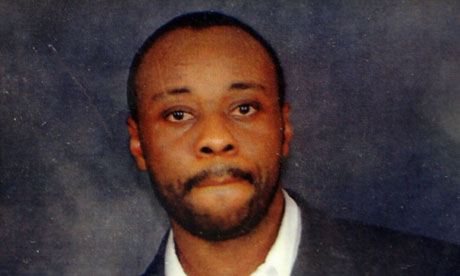Chaos over restraint rules for deportees
![]()
Home Office accused of flip-flop on use of restraints after death of Angolan asylum seeker Jimmy Mubenga
Paul Lewis, Matthew Taylor and Owen Bowcott

The government’s deportation policy has been thrown into confusion after it emerged that the Home Office banned private security firms from forcing detainees on to flights following the death of a refugee, then lifted the moratorium 10 days later.
The chair of the Commons home affairs select committee, Keith Vaz, said he had “huge concerns” over the government’s apparent indecision about whether restraint could be used against deportees and accused officials of “flip-flopping”.
His concerns were echoed by Ed Balls, the shadow home secretary, who said it was now “vital” for the Home Office to release details of the circumstances surrounding the death of Jimmy Mubenga, an Angolan refugee who collapsed and died on a British Airways plane preparing for take-off at Heathrow earlier this month.
A ban on forcing detainees on to commercial flights, which officials described as a precautionary but “unprecedented” measure, was introduced on 15 October, three days after Mubenga lost consciousness while being heavily restrained by three guards working for the security firm G4S.
The Metropolitan police have since arrested the guards, who have been released on bail.
The firm, which conducts the majority of the 10,000 forced removals each year, informed the Guardian that use of restraint at boarding by its guards had been halted at the advice of the Home Office.
All private security firms were instructed by the Home Office to halt using force while officials checked that the techniques used to restrain deportees, which are the same used in prisons, were safe.
Guards conducting deportations on charter flights, which are carried out on aircraft not shared with commercial passengers, were exempted from the ban.
The ban on the use of force was then lifted on Monday, after all escort guards were given new written guidance on how to conduct deportations safely. All escort staff were also given verbal briefings. The Home Office last night refused to release the new guidance, claiming it was “operational and sensitive”.
David Wood, the UK Border Agency’s strategic director for criminality and detention, said: “A minimum use of force is an absolute last resort, and would only ever be used when an individual becomes disruptive or refuses to comply.
“We did pause the use of restraint at boarding of scheduled removal flights as a precautionary and temporary measure. It has now been reinstated.”
The department made no mention of the ban in the last week, despite releasing numerous statements about the use of force against deportees.
Vaz said his committee would demand that the information be released to MPs. “It is essential that we have a clear and consistent policy regarding the force that can be used during deportations,” he said. “This is particularly true given the number of agencies involved in the process. I am hugely concerned that following the tragic case of Jimmy Mubenga, the Home Office seems to be flip-flopping over its decision.”
The home affairs committee will question Lin Homer, the chief executive of the UK Border Agency, about guidelines used by private companies during removals. “Parliament must be informed as to what force can be used, what guidelines are issued, and the procedures in place to ensure the safety of detainees,” Vaz said.
Balls also called for greater transparency. “I asked the home secretary for a briefing on Mubenga’s death two weeks ago, and was refused. It is now vital that Theresa May explains all the facts in the case.”
UKBA is understood to have been thrown into chaos last week after rumours spread that guards were unable to use force. Foreign nationals who informed their escorts they intended to physically resist deportation were permitted to stay.
Mubenga’s death is known to have shocked Home Office officials, who have been repeatedly warned about the safety of deportations.
Five passengers on Mubenga’s flight told the Guardian he was being heavily restrained and complained of breathing difficulties before he lost consciousness. Detectives from the Met’s homicide unit are awaiting the results of a postmortem.
Scotland Yard has opened a second investigation into G4S guards accused of using inappropriate force during another failed removal, six days before Mubenga’s death.
The Metropolitan police confirmed that a team of officers from Heathrow CID were investigating another case, relating to the attempted removal of a Colombian man. José Gutiérrez received hospital treatment after the failed attempt to remove him.
Police are investigating a claim that Gutiérrez, who had been in the UK since the early 1990s and was being deported after having served a six-year prison sentence for robbery and firearms offences, was assaulted during his attempted removal. The Met said it was investigating an allegation of assault made by a third party and that no arrests had been made.
Related Articles
Human rights leaders call for action by Egyptian authorities
![]()
The death toll has risen to more than 800 protesters and bystanders since lasy week’s violent dispersals of pro-Morsi
The Devil’s Experiments
![]()
Guatemalan Victims Still Haunted by US Syphilis Study Marta Orellana says she was playing with friends at the orphanage when
Gallardón acaba con el derecho de las mujeres a decidir sobre su embarazo
![]()
El ministro Ruiz Gallardón en el Congreso de los Diputados. FERNANDO SÁNCHEZ MADRID// El ministro de Justicia, Alberto Ruiz Gallardón ha


